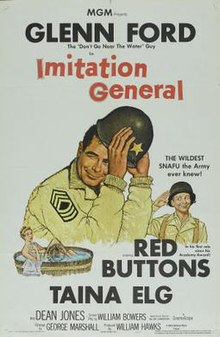Imitation General
| Imitation General | |
|---|---|
 Theatrical release poster | |
| Directed by | George Marshall |
| Written by | William Bowers |
| Based on | Imitation General 1956 short story by William Chamberlain |
| Produced by | William B. Hawks |
| Starring | Glenn Ford Red Buttons Taina Elg |
| Cinematography | George J. Folsey |
| Edited by | Harold F. Kress |
| Distributed by | Metro-Goldwyn-Mayer |
Release date |
|
Running time | 88 minutes |
| Country | United States |
| Language | English |
| Budget | $944,000[1] |
| Box office | $3,165,000[1] |
Imitation General is a 1958 American black-and-white comedy war film in CinemaScope, directed by George Marshall, produced by William B. Hawks, and starring Glenn Ford, Red Buttons, and Taina Elg. The film, distributed by Metro-Goldwyn-Mayer, is based on a short story of the same name by William Chamberlain.
Plot
[edit]In the aftermath of a big battle during World War II, Americans Brigadier General Charles Lane, Master Sergeant Murphy "Murph" Savage, and Corporal Chan Derby are cut off behind enemy lines. The general takes over a farmhouse belonging to annoyed Frenchwoman Simone. Lane determines that there is a gap in the American lines and decides to organize a defense from whatever stragglers he can gather together. Shortly afterwards, however, he is killed saving Murph's life.
The first American soldier to show up, Corporal Terry Sellers, mistakes Murph for Lane, as Murph is holding the general's helmet. This gives Murph an idea. Recalling Lane's assessment that leadership is desperately needed to rally the disorganized troops, Murph masquerades as the general, with Derby and Simone's reluctant help. Murph manages to repulse a couple of attacks spearheaded by German tanks, all the while avoiding Private Orville Hutchmeyer, who knows Murph and holds a grudge against him.
At the end of the engagement, Murph is knocked out by shrapnel, allowing him to "die" and resume his real identity.
Cast
[edit]- Glenn Ford as MSgt. Murphy Savage
- Red Buttons as Cpl. Chan Derby
- Taina Elg as Simone
- Dean Jones as Cpl. Terry Sellers
- Kent Smith as Brig. Gen. Charles Lane
- Tige Andrews as Pvt. Orville Hutchmeyer
- John Wilder as Lt. Jeff Clayton
- Ralph Votrian as American Pfc.
Box office
[edit]According to MGM records, the film earned $1,915,000 in the US and Canada[2] and $1,250,000 elsewhere, resulting in a profit of $1,095,000.[1]
References
[edit]- ^ a b c The Eddie Mannix Ledger, Los Angeles: Margaret Herrick Library, Center for Motion Picture Study.
- ^ "Top Grossers of 1958". Variety. 7 January 1959. p. 48. Please note figures are for US and Canada only and are domestic rentals accruing to distributors as opposed to theatre gross
External links
[edit]- Imitation General at IMDb
- Imitation General at the TCM Movie Database
- Imitation General at AllMovie
- Imitation General at the AFI Catalog of Feature Films
- 1958 films
- 1950s war comedy films
- American black-and-white films
- Films directed by George Marshall
- Metro-Goldwyn-Mayer films
- CinemaScope films
- Military comedy films
- Western Front of World War II films
- American World War II films
- Films based on short fiction
- American war comedy films
- 1958 comedy films
- 1950s English-language films
- 1950s American films
- English-language war comedy films
- World War II film stubs
